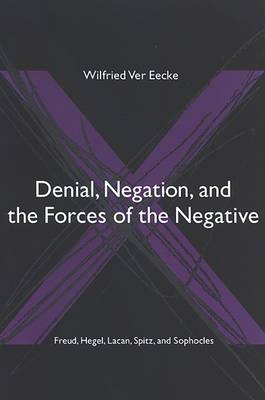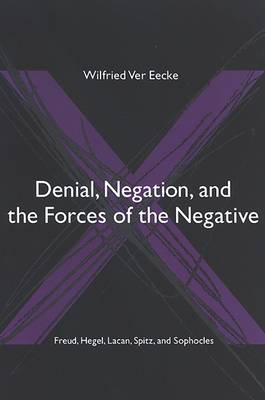
- Afhalen na 1 uur in een winkel met voorraad
- Gratis thuislevering in België vanaf € 30
- Ruim aanbod met 7 miljoen producten
- Afhalen na 1 uur in een winkel met voorraad
- Gratis thuislevering in België vanaf € 30
- Ruim aanbod met 7 miljoen producten
Denial, Negation, and the Forces of the Negative
Freud, Hegel, Lacan, Spitz, and Sophocles
Wilfried Ver EeckeOmschrijving
A comprehensive account of denial viewed not only psychoanalytically but also philosophically.
Finalist for the 2006 Goethe Award for Psychoanalytic Scholarship presented by the Section on Psychoanalytic and Psychodynamic Psychology of the Canadian Psychological Association
It is often the case that painful truths emerge first in the form of denial; one needs to create distance from what is painful. In Denial, Negation, and the Forces of the Negative Wilfried Ver Eecke constructs a comprehensive, lucid account of denial's psychological and philosophical dimensions while using Freud, Hegel, Lacan, Spitz, and Sophocles to help us understand this unavoidable aspect of human existence.
Ver Eecke acknowledges Hegel's claim that the road to truth is not a path of doubt, but a highway of despair, and argues, via Hegel's ontology of the person, that denial can be understood as a desiring being's defense against despair. By examining the role of no-saying in children, Freud's claims about freedom of the will and its necessary prerequisites, and Sophocles' Oedipus, Ver Eecke demonstrates the idea that denial is connected with situations in which the self-image of a person is threatened. He concludes with a colleague's autobiography to highlight the deep, tragic experiences that denial covers, and the enormous psychic work required to overcome profound denial, with the ultimate reward of experiencing oneself as the fulfillment of the promise of life.
Specificaties
Betrokkenen
- Auteur(s):
- Uitgeverij:
Inhoud
- Aantal bladzijden:
- 200
- Taal:
- Engels
- Reeks:
Eigenschappen
- Productcode (EAN):
- 9780791466001
- Verschijningsdatum:
- 1/06/2006
- Uitvoering:
- Paperback
- Formaat:
- Trade paperback (VS)
- Afmetingen:
- 153 mm x 228 mm
- Gewicht:
- 267 g

Alleen bij Standaard Boekhandel
Beoordelingen
We publiceren alleen reviews die voldoen aan de voorwaarden voor reviews. Bekijk onze voorwaarden voor reviews.









